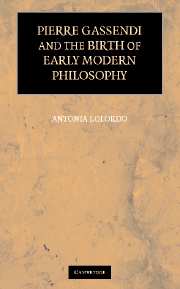Book contents
- Frontmatter
- Contents
- Preface
- References to Gassendi's Works
- Introduction
- 1 Gassendi's Life and Times
- 2 Gassendi's Philosophical Opponents
- 3 Skepticism, Perception, and the Truth of the Appearances
- 4 Cognition, Knowledge, and the Theory of Signs
- 5 Space and Time
- 6 Atoms and Causes
- 7 Bodies and Motion
- 8 Generation, Life, and the Corporeal Soul
- 9 The Metaphysics of Body
- 10 Faith, Reason, and the Immaterial Soul
- Bibliography
- Index
10 - Faith, Reason, and the Immaterial Soul
Published online by Cambridge University Press: 24 July 2009
- Frontmatter
- Contents
- Preface
- References to Gassendi's Works
- Introduction
- 1 Gassendi's Life and Times
- 2 Gassendi's Philosophical Opponents
- 3 Skepticism, Perception, and the Truth of the Appearances
- 4 Cognition, Knowledge, and the Theory of Signs
- 5 Space and Time
- 6 Atoms and Causes
- 7 Bodies and Motion
- 8 Generation, Life, and the Corporeal Soul
- 9 The Metaphysics of Body
- 10 Faith, Reason, and the Immaterial Soul
- Bibliography
- Index
Summary
Gassendi's assessment of the extent of our knowledge of the human mind changed significantly over the course of his career. In the preface to the 1624 Exercitationes, he plans to show that “whatever cognition we have of intelligences and the thrice-great God is by orthodox faith, ” so that arguments from the natural light are in vain (3.102). He does not say anything about cognition of the immaterial human soul, but it is reasonable to suspect that the Exercitationes would have treated that as gained through faith alone as well. Seventeen years later, in the Disquisitio, Gassendi argues that we cannot conceive of an immaterial mind, although we know by faith that the mind is immaterial, and he endorses a version of the cosmological argument for God's existence. Still later, in the Syntagma, he provides arguments for both the existence of God and the immortality of the incorporeal human soul.
Although Gassendi is committed to the existence of God and an incorporeal, immortal human soul throughout his career, explaining knowledge of the incorporeal is always a problem for him. The imagistic tendencies of his account of mental content make it difficult to see how we can have cognitive access to incorporeal beings, and its causal tendencies make the situation even worse, given that we have no direct perceptual contact with God or angels. Indeed, it is precisely this worry that lies behind the Disquisitio's denial that we have an idea of the incorporeal soul.
- Type
- Chapter
- Information
- Pierre Gassendi and the Birth of Early Modern Philosophy , pp. 227 - 252Publisher: Cambridge University PressPrint publication year: 2006

